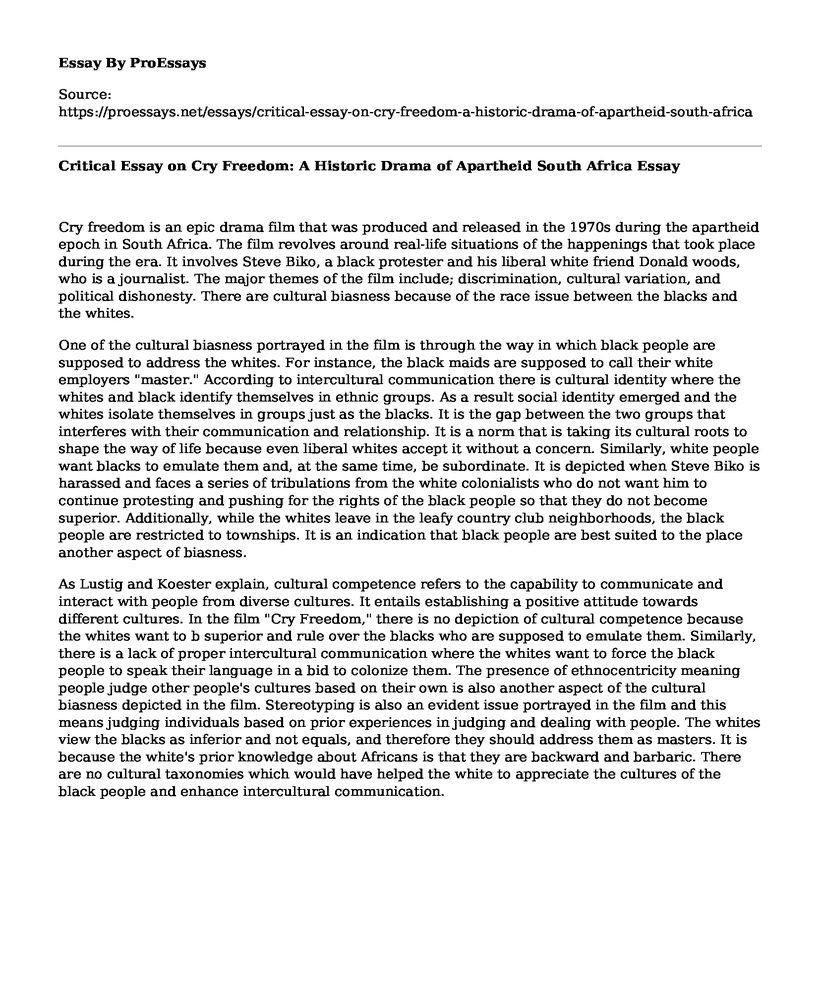Cry freedom is an epic drama film that was produced and released in the 1970s during the apartheid epoch in South Africa. The film revolves around real-life situations of the happenings that took place during the era. It involves Steve Biko, a black protester and his liberal white friend Donald woods, who is a journalist. The major themes of the film include; discrimination, cultural variation, and political dishonesty. There are cultural biasness because of the race issue between the blacks and the whites.
One of the cultural biasness portrayed in the film is through the way in which black people are supposed to address the whites. For instance, the black maids are supposed to call their white employers "master." According to intercultural communication there is cultural identity where the whites and black identify themselves in ethnic groups. As a result social identity emerged and the whites isolate themselves in groups just as the blacks. It is the gap between the two groups that interferes with their communication and relationship. It is a norm that is taking its cultural roots to shape the way of life because even liberal whites accept it without a concern. Similarly, white people want blacks to emulate them and, at the same time, be subordinate. It is depicted when Steve Biko is harassed and faces a series of tribulations from the white colonialists who do not want him to continue protesting and pushing for the rights of the black people so that they do not become superior. Additionally, while the whites leave in the leafy country club neighborhoods, the black people are restricted to townships. It is an indication that black people are best suited to the place another aspect of biasness.
As Lustig and Koester explain, cultural competence refers to the capability to communicate and interact with people from diverse cultures. It entails establishing a positive attitude towards different cultures. In the film "Cry Freedom," there is no depiction of cultural competence because the whites want to b superior and rule over the blacks who are supposed to emulate them. Similarly, there is a lack of proper intercultural communication where the whites want to force the black people to speak their language in a bid to colonize them. The presence of ethnocentricity meaning people judge other people's cultures based on their own is also another aspect of the cultural biasness depicted in the film. Stereotyping is also an evident issue portrayed in the film and this means judging individuals based on prior experiences in judging and dealing with people. The whites view the blacks as inferior and not equals, and therefore they should address them as masters. It is because the white's prior knowledge about Africans is that they are backward and barbaric. There are no cultural taxonomies which would have helped the white to appreciate the cultures of the black people and enhance intercultural communication.
Cite this page
Critical Essay on Cry Freedom: A Historic Drama of Apartheid South Africa. (2023, Apr 08). Retrieved from https://proessays.net/essays/critical-essay-on-cry-freedom-a-historic-drama-of-apartheid-south-africa
If you are the original author of this essay and no longer wish to have it published on the ProEssays website, please click below to request its removal:
- Article Analysis Essay on Impact of Knowledge Management on the Activation of E-Commerce Using Social Media
- 12 Angry Men: Film Analysis Essay
- Analysis of the Song Another Brick in the Wall Paper Example
- Gattaca - Movie Analysis Essay
- Essay Example on America's Judge Marilyn Milian: A 41-Minute Courtroom Drama
- Essay Sample on Seed: The Untold Story - Uncovering Challenges in Agro-Industry
- Free Essay Example on Social Media Addiction: Impact on Mental Health & Habits







